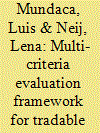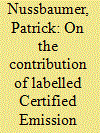|
|
|
Sort Order |
|
|
|
Items / Page
|
|
|
|
|
|
|
| Srl | Item |
| 1 |
ID:
092820


|
|
|
|
|
| Publication |
2009.
|
| Summary/Abstract |
Evaluation of sustainable residential energy system is complex process, in which not only the economic aspect, but also the energetic and environmental effects should be taken into consideration. In this paper, an integrated design and evaluation model has been developed, by combing linear programming and multi-criteria evaluation method, in order to determine the optimal residential energy system while considering different types of information. As an illustrative example, an investigation is conducted for a typical residential building in Kitakyushu, Japan. A set of residential energy alternatives, including both conventional energy and renewable energy applications, are assumed for adoption. Based on the optimal design results from the linear programming, the various alternatives have been assessed against economic, energetic and environmental criteria. According to the evaluation results, currently, renewable energy systems are not competitive unless strong attention is paid to the environmental benefits. All electric system may be a transitional consideration before reaching an actual low carbon residential energy system. Furthermore, the evaluation result is greatly influenced by the criteria priority, as well as the evaluation method.
|
|
|
|
|
|
|
|
|
|
|
|
|
|
|
|
| 2 |
ID:
092764


|
|
|
|
|
| Publication |
2009.
|
| Summary/Abstract |
Recent years have witnessed regained political momentum on energy efficiency and interest in establishing markets is growing. As a result, Tradable White Certificate (TWC) schemes of differing design have been implemented in Great Britain, Italy and France. Much attention is being paid to justifying and evaluating such schemes. In this paper, we develop and apply a multi-criteria framework for evaluating TWC schemes-an approach that attempts to cover their individual design features. A broad evaluation is conducted regarding energy-saving and environmental effectiveness, economic efficiency, cost-effectiveness, transaction costs, political feasibility, administrative burden and technical change. The results show the design and performance of TWC schemes to be case and context-specific, and generalisations are thus inappropriate. This evaluation supports the cost-effectiveness modelled for the British scheme and the assumption that a TWC scheme is an economically efficient policy instrument. For the other, more complex TWC schemes, more data and experience are needed to judge their ex-post merit. On the whole, the proposed multi-criteria evaluation requires considerable data and complementary methods. However, the framework improves the understanding of the broad effects and attributes of TWC schemes. It deals with various empirical and normative aspects that can be applied in their evaluation.
|
|
|
|
|
|
|
|
|
|
|
|
|
|
|
|
| 3 |
ID:
088029


|
|
|
|
|
| Publication |
2009.
|
| Summary/Abstract |
The Clean Development Mechanism (CDM) has a twofold objective, to offset greenhouse gas emissions and to contribute to sustainable development in the host country. The contribution to the latter objective seems marginal in most CDM activities. Also, CDM activities are unevenly spread among developing countries. In response to these concerns, initiatives with the objective of promoting CDM projects with broad local sustainable development dividends have been launched, such as the Gold Standard and the Community Development Carbon Fund. The Gold Standard label rewards best-practice CDM projects while the Community Development Carbon Fund focuses on promoting CDM activities in underprivileged communities. Using a multi-criteria method, the potential contribution to local sustainable development of those CDM projects with particular attributes is compared with ordinary ones. This evaluation suggests that labelled CDM activities tend to slightly outperform comparable projects, although not unequivocally.
|
|
|
|
|
|
|
|
|
|
|
|
|
|
|
|
|
|
|
|
|